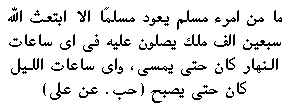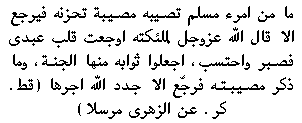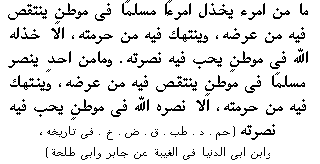Prof. Dr. Mahmud Es'ad COŞAN
AKRA FM Friday Discourse
February 11, 2000
THE STATE OF A MUSLIM FACING CALAMITIES
As-salaamu alaikum wa rahmatullahi wa barakatuh
Dear brothers and sisters. May your Friday be blessed. May Allah Almighty bestow on you His blessings, mercy and grace in this world and in the hereafter. May He give you opportunities to do good deeds and grant you happiness in this world and in the hereafter.
a. The Rewards for Visiting Those Who has Ailments
The Prophet (pbuh) has said:

RE. 380/4 (Ma min imri-in muslimin yaûdu muslimen il-labte-asallâhu seb'îna elfe malakin yusallûna alayhi fî ay-yi sâ'atin-nahâri kâna hat-tâ yumsiya wa ay-yi sâ'atil-layli kâna yusbiha.)
This is the text of the hadith reported by Hadrat Ali RA and KW. It is about visiting those who have ailments or those who have been hospitalized. There are many ahadith about this kind of visits. when we read them, we explain the rewards of such visits. Especially on Fridays, if a person visits patients, visits the cemetery, gives some charity, and performs the Friday prayer while he is fasting, there will be tremendous rewards waiting for him in the hereafter.
(Ma min imri-in muslimin) "There is no Muslim servant (yaûdu muslimen) who visited another Muslim servant (il-labte-asallâhu seb'îna elfe malakin) that Allah did not appoint seventy thousand angels for him."
Aada-yaûdu; also means visiting a sick person as well as returning back. The meaning of the words here is that when a Muslim visits a sick person, Allah sends seventy thousand angels to the visitor. (Yusallûna alayhi) these angels pray for the visitor. (Fî ay-yi sâ'atin-nahâri kâna hat-tâ yumsiya) From the time of the visit in the day until the evening, they pray for the person. ( Wa ay-yi sâ'atil-layli kâna yusbiha) From the time of the visit at night until the morning, these angels pray for him."
The conclusion we must draw from this hadith is that one of the duties of Muslims, one of the responsibilities of brotherhood and love towards the Muslims, is visiting the Muslim servant in sickness, wishing well for him, and provide moral support for him. This is very rewarding. It is even more rewarding when it is carried out on a Friday. That is why we ought to allocate some time for visiting ill Muslims. When you plan your week, remember to spare some time for such visits. We should not neglect it all.
Any person who is in a hospital would love visitors. I had stayed in a hospital many times, so I know it well. Visitors would make the patient real happy. When a patient in the ward does not get any visitors, he feels very sad. Please do not neglect visiting your Muslim brethren when they are ill.
Visiting the patients in a hospital has some positive effects on a person. In the flurry of daily routines and in the fast flow of events of life, unfortunately people forget about the hereafter. We wish they get no problems with their health and comfort, yet sometimes everything does not happen as we wish. The health problems that require hospitalization are reminders of death and the hereafter. They can be seen as a warning that life in this world is temporary. That is why visiting hospitals is beneficial from a spiritual point of view.
When a person visits the patients in hospitals, he brings comfort and consolation to the patients while he realizes how great and important the health is. This is also very important. A person may not realize what he is blessed with. "The fish in the ocean are not aware of the ocean." People sometimes are not aware that they are in countless blessings until they lose some. Health is a great blessing, so we must appreciate it. Visiting the hospitals and seeing how some patients suffer, we must turn to Allah and thank Him for our health.
Unfortunately, we are not taking good care of our health. It is a national problem. We often challenge the diseases. In fact, we must protect our health before we fall ill and take all necessary precautions. We must see a physician and have a check-up in addition to asking for recommendations to maintain a good health. Some terminal diseases can be treated in the early stages. That is why the early diagnosis is important. When the disease advances too much to cure, the doctor will ask why the patient did not see a doctor earlier. Visiting the hospitals may spark an awakening about one's health, so a person who visits the hospitals earns rewards and becomes more health conscious.
I recommend that you visit our brothers in the hospitals. You make them happy and ask them to pray for you because the prayers of the patients are answered. The prayer of the oppressed and the prayer of the sick are answered. Try to get their blessings and prayers. You can hold their hands, look at their face with mercy, and say good words and prayers for them. They will reply similarly, so everybody benefits the visit.
When two Muslims meet, they "clean" each other spiritually just like two hands cleaning one another physically. That is why Muslims have to be particular and eager about fulfilling their social responsibilities. They should not be lax and negligent about them. This hadith is a reminder, an invitation for all of us to carry out our responsibilities.
b. One Who Faces a Calamity
The second hadith is also from the same page of the Hadith collection Ramuz al Ahadith:

RE.380/6 (Mâ min imri-in muslimin tusîbuhu musîbetun tuhzinuhu feyarji-'u il-lâ qalallâhu 'azza wa jalla li malâikatihî: Awj'atu qalba abdî fasabara wahtasaba ic'alû thawabahû min hal-jannata wa mâ dhakara musîbatahû farraj-ja'a il-lâ jad-dadallâhu ajrahâ)
This hadith, too, is reminding us about an important word that we must say. Our beloved Prophet (pbuh) said: "Consider a Muslim servant who is experiencing a calamity, a hardship that made him sad and unhappy. He says, 'what can do-- It is from Allah. In-na lillahi wa inna ilayhi raji'ûn -- Surely we belong to Allah and to Him is our return. This is destiny.'"
Here the word istarji'a means the utterance of the words In-na lillahi wa inna ilayhi raji'ûn. "This servant believes that the calamity is from Allah and accepts is as such saying the these words. (Qalallâhu 'azza wa jalla li malâikatihî) Almighty Allah says to His angels: '(Awj'atu qalba abdî) I broke my servants heart. I sent the calamity to my servant.'"
Calamities are not something enjoyable or fun. They bring sadness and unhappiness. They can really hurt a persons feelings, devastate his heart, and fill his eyes with tears. With such an intense sorrow, some people start behaving violently--some "pull their hair, some beats their knees." I must remind you that this kind of violent reaction is not permissible in Islam. One has be patient and pull himself together.
It is part of being human to feel sorry and sad when something bad happens to his property, his body, his children, his relatives or his friends. Sadness, sorrow, rush, confusion and alike will be experienced. If a friend would ask, "You look so worried. What is wrong?" The response would be, "Such and such things happened." If the person who faces the difficulty realizes that it is from Allah, and so he acts calmly and patiently, Allah says, "I hurt my servant's feelings, but he was patient and he expected its reward from Me."
A good believer does not scream, cry out or complain when a calamity falls on him. Instead, he acknowledges that it is from Allah. He knows that Allah will reward him if he responds patiently. So, he stays calm, pulls himself together, and turn to Allah.
(Man âmana bil-qader, wa amina minal keder) "He who believes in destiny stays away from sorrow."
It is a statistical fact that suicide attempts are most frequent among non-believers. Since their people have stronger believes, such incidences are quite seldom in Muslim countries. Some time ago, a group of researchers from Sweden came to Turkey to investigate this fact. They asked, "We provide all kinds of comfort and facilities to our people. We do our best as a social state. But, we have the most serious suicide problem all over the world. You have plenty of hardship, no proper transportation, no drinking water, no medicine, no physician, no jobs. Nevertheless you don't have such a suicide problem as the statistics indicate. Why is that?"
The reason for the low suicide attempt rate is that the believers stay patient relying on Islam. They are aware that patience has limitless rewards. "One half of the religion is gratitude and thanksgiving; the other half, patience." You thank for blessings while being patient against hardship, do good deeds as a devote Muslim and enjoy Allah's mercy.
Allah (ST) orders: "(Wahtasaba) This servant of mine has expected his reward from Me; (ic'alû thawabahû min hal-jannata)-- therefore, (Oh my Angels) make his reward paradise!"
(Wa mâ dhakara musîbatahû farraj-ja'a il-lâ jad-dadallâhu ajrahâ) Even after years following such a hurdle, if he recalls that incidence and sadly says "In-na lillahi wa inna ilayhi raji'ûn," acknowledging that it was from Allah, and submitting himself to His will, Allah (ST) rewards him once more. Allah (ST) would never stop refreshing his reward. So, we should be patient against calamities, we should know that they are from Allah.
There are usually two reasons why troubles from Allah (ST) should strike people: First, the troubles are for them to pass the test, attain higher degrees and earn more rewards. That is why prophets and saints had much trouble. For instance, Ayyub (AS) [Prophet Job] suffered a terrible long-lasting disease, had such big troubles. This is a historical fact. Though he was a prophet whom Allah blessed, he experienced such great calamities. Thus, Allah (ST) tests his beloved servants in this world. Then He rewards them for their patience and for their success in the test.
The second reason for the troubles and calamities is that people commit a crime and Allah (ST) punishes them. This punishment is considered as a compensation for their sins in this world. At least, he or she is saved in the Hereafter. Therefore, one should think about why the calamity has stricken him and try to see the reason behind it.
Sometimes, a person may evaluate himself: "I have done such and such, that is why Allah has given this to me. I shouldn't commit such a fault and do wrong again." It is something good for man to see his faults. But if it is not obvious, one should think "Perhaps I have done something wrong ,but I couldn't understand," and remain patient and expect the reward from Allah, saying "Maybe Allah (ST) is doing this to me to test me and to give me more rewards."
Some people have a wrong notion: "Good servants should enjoy a prosperous and comfortable life while sinners should have the trouble." No, it is not the case in this world. Just the contrary, pharaohs, tyrants, the oppressors, the shameless people almost always lead a prosperous life. But the life in this world is nothing, worthless, insignificant, little when compared to the life in the Hereafter. These things happen because for Allah, this world doesn't even worth a wing of a fly. They consider this as a gain but after this brief period of life, they will meet the endless torments. This is something terrible, but they don't understand. Allah (ST) tells this to us via the prophets and the books He has sent. But there are people who understand and who do not, who behave accordingly and who do wrong.
May Allah give us insight. May Allah help all of us appreciate the divine justice, see the examinations and pass them according to Qur'an and the traditions of Prophet Muhammad (pbuh).
c. Helping a Muslim
The third hadith:

(Mâ minimri-in yakhzulumre-en muslimen fî mawtinin yuntakasu fîhi min irdhihî, ve yunteheku fîhi min hurmetihî, illâ hazelehullàhu fî mevtinin yuhibbu fîhi nusratehû. Wa mâ min ehadin yansuru muslimen fî mevtinin yuntakasu fîhi min irdihî, wa yunteheku fîhi min hurmetihî, illâ nasarahullàhu fî mevtinin yuhibbu fîhi nusratehû.)
This hadith is recorded in sources including Ahmed ibn-i Hanbel, Taberânî, Abu Dâwud, Bukharî and Ibn-i Ebid-Dunya. It is also about a heavenly law:
"(Mâ minimri-in) consider a person (yakhzulumre-en muslimen) who does not help a Muslim (fi mawtinin) in such a place (yuntakasu fîhi min irdhihî) where his honor and dignity is attacked (wa yunteheku fîhi min hurmetihî) where he is improperly treated instead of being respected..." This person is not helping the Muslim in such a situation.
What will happen to this person who did not help the Muslim? (Illâ hazelehullàhu fî mevtinin yuhibbu fîhi nusratehû) "Allah will not help him when he needs and expects help from Allah." He will be helpless in this world and in the hereafter. Unexpectedly, he realizes that there will be no help coming from anybody. He will be all alone to face the difficulties. This is just a punishment for him for not helping his Muslim brother.
May Allah save us from such a situation and forgive us our shortcomings. Our brothers in Bosnia, Kosovo, Crimea, Caucasia, Middle Asia, Kashmir, Algeria, Egypt and in many other parts of the world are treated inhumanely. The so-called superpowers are overlooking the oppression Muslims are experiencing. Those who have a conscience do not approve this injustice.
While these oppressions are taking place, nobody seems to be helping them to ease the suffering. Later on a similar calamity may fall on those who failed to help these suffering Muslims and they will find nobody helping them. This is a divine law. Allah will not send them any help: "You failed to help your Muslim brother sometime ago, now you want my help. I will not send you any help!"
On the other hand, "(Wa mâ ahadin) consider another person (yansuru musliman) who helps a Muslim, answers his call for help (fî mawtinin yuntakasu fîhi min irdhihi) when the honor and dignity of the Muslim is attacked or (wa yunteheku fîhi min hurmetihi) when he is belittled or disrespected, (illa nasarahullàhu) verily Allah helps this person (fî mawtinin yuhibbu fîhi nusratahû) when he needs and expects help from Allah."
Dear Brothers and sisters, Allah SWT is testing us in this world. He sends help for us depending on our own deeds. When a Muslim brother is in need of help, we have to help him immediately. Who knows we might be in need one day. Allah will not help us if we did not help our brother in need. Therefore, let us be helpful to each other, be aware, active and careful. Let us look at our community and do good deeds, and prevent the bad deeds. One of the ways of good deed is to stop something bad.
Consider a man, who does not care about anything except for going to masjid and coming back to home. Is this a man with a good deeds? Is he an exemplary person? No, someone who does not care about community problems, does not care about his friends and neighbors, who does not enjoin the good end prevent evil, who does not work is not a good Muslim. Even Prophet (SAW) said that these kind of people do not belong to the blessed group that also includes the Prophet (SAW). He (SAW) excludes this kind of person from the Muslim community. Therefore, we should do our best to do the righteous deeds, and stop the bad deeds.
According to the hadith of Prophet SAW, if you visit a sick person, Allah likes you; if you feed a poor person, Allah likes you. If you provide a shelter to a poor person or if you help someone Allah likes it . Allah likes it if you are sincere. If you do the opposite, then Allah punishes you according to your deeds. He will not help you when you are in need.
Therefore, we are preparing future calamities due to our bad deeds and behaviors. We have to be extremely careful on this issue. May Allah make us see the truth as the truth and obey it. May He help us do good deeds and be on the side of the righteous. May He make us see the evil as the evil and protect us from it. May Allah make each one of us someone who does good deeds, stays away from evil, and helps those in need. May Allah give each one of us a fruitful life, full of righteous deeds. May we stand before Him as obedient servants and successful people who passed the test.
"(Wa idhibtelâ ibrahîme rabbuhû bikalimâtin fe-etem-mehun-ne) [when his Lord tested Abraham by means of certain words, and he fulfilled them...]" (Baqara 124). Allah also tested prophets; He gave calamities to them. When they were successful, He made kind remarks about them. When they had mistakes, He instructed them to correct their mistakes.
In conclusion, let us not forget even for a moment that this life is a test. Let us be active Muslims. Let us support good events/activities. Let us work to stop the evil. May Allah make all of you successful in this world as well in the hereafter. May the peace, mercy and blessings of Allah be with you.
February 11, 2000, Australia